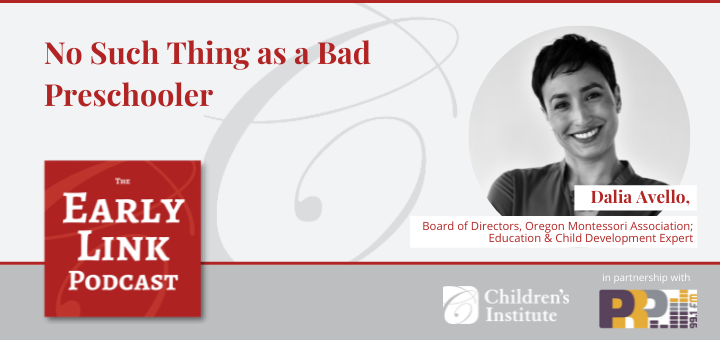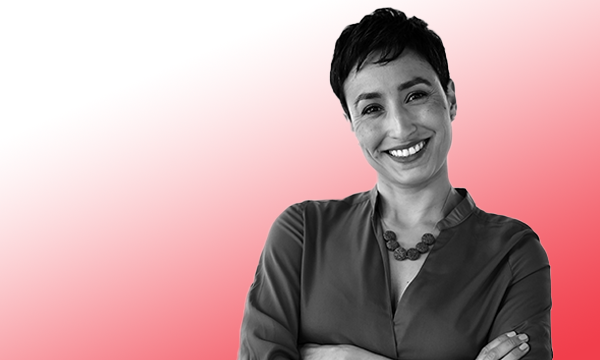
No Such Thing as a Bad Preschooler: An Interview with Dalia Avello
On this episode of The Early Link Podcast, host Rafael Otto speaks with guest Dalia Avello. Dalia serves on the Board of Directors of the Oregon Montessori Association, trained as a psychologist, is a certified Montessori teacher, and is an expert in Education and Child Development.
Guest:
Dalia Avello has worked for over 15 years in private, public, and non-profit organizations in the areas of research and organizational development. She has dedicated the last 10 years of her career to Infancy and Early Childhood, with special focus on adversity and mental health policy. A large part of her work includes helping organizations successfully implement monitoring programs tracking children’s physical and socio- emotional development.
Through her work with the Oregon Montessori Association she has led projects in the areas of advocacy, professional development, inclusion and social justice. She shares her time between her work on behalf of the Montessori community, her own consulting company, and volunteering as a NICU baby cuddler in a local pediatric hospital.
Summary:
Dalia begins by discussing the origins and the individual behind Montessori education. In addition, she notes the motivations behind it, and how they closely relate to Senate Bill 236 in our Oregon legislation. Further, she recounts her experience testifying before the legislature in favor of the bill and her overall influence in that process.
Next, Dalia touches on one of her projects pertaining to trauma-informed care in young children. Finally, she notes how brilliant children are, and why we should allow them to participate more in legislations pertaining to their care and education.
Additional Resources:
Transcript
Rafael Otto: This is the Early Link Podcast. I’m Rafael Otto. As usual, you can catch us on the airwaves on 99.1 FM in Portland on Sundays at 4:30 PM or subscribe and listen, wherever you find your podcasts. Today, I’m speaking with Dalia Avello who serves on the board of directors of the Oregon Montessori Association.
She trained as a psychologist, is a certified Montessori teacher and has expertise in the education and international development fields. She has led her career internationally, but calls Oregon home.
Dalia, it’s great to have you on the podcast today. Welcome!
Dalia Avello: Thank you. Thank you for inviting me.
Rafael Otto: Let’s start with a little bit of background about the Montessori approach to education. Can you talk about that history a little bit and give us some context? And what does it mean? What does the Montessori experience look like for young children and for teachers?
Dalia Avello: Absolutely. I would love to tell you. It’s very interesting, but we need to go quite far in time. Think about late 1800s in Italy in Europe. So there was this woman called Maria who, uh, was quite smart, very determined. She wanted to be a doctor. Obviously not something that people expected her to do. But she persevered and eventually graduated, doing very well as a physician, from the University of Rome. And being a physician, she got a position helping in a psychiatric hospital associated with the university.
And one of the things that she describes in her books as seeing is that the hospitals in Rome were filled with children that were experiencing poverty. But she particularly wanted to work in this psychiatric hospital that was called “The Great Asylum of Rome,” where they were the “feebleminded” and the “idiots.” That’s how the terms were used at the time. And so they, um, have all these children there together with the adults, and they had no hope for them because they didn’t expect the society, do not expect these children to be able to do anything. So she felt very strongly about them, as such to work with them.
At the time, she also fell in love with someone and got pregnant, but out of wedlock. And that was a Catholic country where that was not something you could do. So she had to disappear for some time to have the baby. She did a lot of studying about what was happening in France. Because you might remember from studying, there was this boy in France that was found in the jungle when he was about fourteen. There are movies about him.
So a couple of physicians had found this boy and they were determined to bring this wild child to society and help him how to speak and teach. So she was interested in what these physicians in France did. She translated all of that while she waited for the baby to be born. Came back with all this knowledge from her European tour.
The baby went to a family because it was so hard for her to become a doctor. And I think she wanted to continue in the career. But imagine a mom that had to abandon her child. So she felt very connected with these children, started working with them and saw them as children that, because they were under the care of doctors, they were not under the care of educators.
Rafael Otto: Right.
Dalia Avello: And so she started working with them using these tools that the French doctors had created, and started to get really good results and people were very impressed. They were like, “Well, how do you do it Maria? Like, how is it possible? We had no hope for the children.” And so she created an institute that also took, not just the children from the hospital, but the children that were at the schools. And they were deemed, how do you say, the most dangerous in the community, the children that were subnormal, the children that could not learn. Those children, the schools have the permission to expel them, but no one had the responsibility for taking care of them. So they were left to their own devices and they will become, you know, homeless.
So, families sometimes reject them. She took all of them. She took all of the children actually from the asylum, plus all the children they didn’t want, and created the center and lived with them for 10 years. And then after the 10 years of huge success, she was very famous, you know, and she started to wonder: If I get all these results with children that had some difficulties, the children that are neurodiverse, how we will call them today, what will happen if I work with children that are developing normally?
And at the time there was this project in the slums of Rome being built. And, um, this gentleman had this group of abandoned children doing all kinds of things that they should not be doing. And there was no one controlling the children or taking care of them. And for him, it was cheaper to hire this lady that he saw in the newspaper than to pay for the damage these little criminals who are going to have. This is all the descriptions from the books.
So they gave her these children, she started the school and then she started to get tremendous results. And her key? She wasn’t an educator. She couldn’t have worked at a school even if she wanted, because she was a physician, not a teacher. She didn’t have the credentials. So she used the scientific method and did a lot of observation and experimentation, created many materials.
And based on that, she said to get results see what worked for the children and the thing grew and grew. She published a book. It was supposed to be called, “Scientific Pedagogy.” That was what Montessori education should have been called. But then, um, you will know like “Obamacare” and “The Affordable Care Act,” the Scientific Pedagogy ended up being called, Maria Montessori” or “Montessori Pedagogy,” which is what we know today. And it’s essentially a system of vocational pedagogy that is based on the development of children, and it’s based on serving the needs of children so that you help them develop. And the classrooms are, well, spaces for the children to flourish.
So the experience for the child is an environment where they feel welcome, where they have materials are very attractive to them, or they can work and they can develop the skills that they want to develop.
Rafael Otto: You mention this as part of the history in the schools that children were being expelled from the schools, and those were the kids that Maria wanted to work with initially. And so there’s a connection to what’s been happening here in Oregon, locally with the bill, which is called Senate bill 236, which prevents suspension and expulsion.
As of today recording this podcast, we know that that bill has passed and is headed to the governor’s desk, Governor Brown’s desk, for signing. Talk about that connection between the history of the Montessori approach and what’s happening today in Oregon with the passage of that bill.
Please download the full transcript below.

